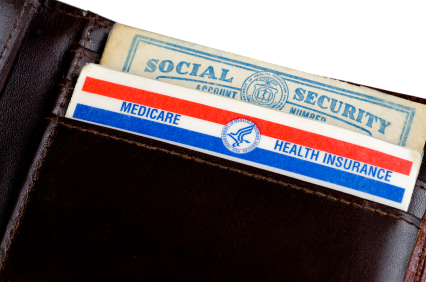We’re getting the Medicare we deserve.

Click here to listen to the broadcast of You Tell Me on KTBB AM 600, Friday, April 27, 2012.
On Monday (04/23), the 2012 Trustees Report on Medicare was released and the news isn’t as bad as you might think.
It’s worse.
Last year, Medicare took in $260.8 billion. It paid out $549.1 billion creating a cash deficit of $288.3 billion. Defenders of the Medicare status quo dismiss the cash deficits by pointing out that Medicare benefits from “general revenue transfers,” hoping that no one will ask what that means in non-Washington speak.
But since you asked, I’ll explain. A general revenue transfer is simply a euphemism for the practice of raiding the treasury. To cover the shortfalls that the Medicare taxes that are withheld from our paychecks and the premiums paid by seniors don’t cover, Medicare simply sends a chit to the Treasury Department and the Treasury Department puts money in Medicare’s checking account. (Many of you with kids in college will immediately relate to this.)
This arrangement could conceivably be OK except for the fact that the Treasury is having to go get money from outside benefactors deposited into its account. About a hundred billion a month or so or about the equivalent of $2.3 million every second.
We’ve become fond of saying that “we’re borrowing money from China to pay our bills here at home,” but to the extent that that was once true, it’s a whole lot less true now. Without many of us noticing, China and other sovereign buyers of U.S. debt have sharply reduced their purchases of U.S. Treasury bonds, effectively saying, “Maybe we should see if these guys can get their act together before we loan them any more money.”
So the money the Treasury uses to cover payroll, pay the bills and to deposit into Medicare’s checking account every month has increasingly been coming from the Federal Reserve, which in return for an IOU from the U.S. Treasury, has more or less been conjuring money out of thin air and loaning it to the U.S. government. There’s an innocuous-sounding euphemism for this practice, too. It’s called “monetizing the debt.”
Medicare thus, all by itself, accounts for a fifth of U.S. borrowing and will account for much more as more Baby Boomers retire.
The numbers are already staggering. For Medicare Part A (hospital coverage) to be solvent, Medicare payroll taxes will have to go up by 31 percent. For Part B (payments to doctors) and Part D (prescription drugs) the amount seniors pay in premium will have to go up by a combined $6,377.
We all know that’s not going to happen.
So Medicare alone, without the profligacy of every other department, agency and program of the government, has the power to bankrupt the nation.
Reacting to the Trustees Report, President Obama said that it’s time to raise the Medicare tax rate on the rich in order to bring about “fairness” and to put Medicare on a “more sound financial footing.” But no one ever asks him, “By how much should the tax be raised?”
So I did the math. If you simply nick every taxpayer with taxable income over $1 million at the rate of 74 percent, you can erase the Medicare deficit.
If the answer to the remaining federal deficit of about $1 trillion remains to tax the rich, confiscating the remaining 26 percent of all income over $1 million will wipe out about 17 percent of it meaning that you’ll only have to find about $830 billion from Lord knows where to balance the budget.
(And who knows, maybe the most successful people in the country would sit still for having one hundred percent of their incomes confiscated by the government. Or am I crazy?)
It’s a bleak picture but don’t blame it all on the politicians. Every time someone even suggests raising the Medicare participation age or instituting means testing of eligibility, Congressional office phone lines explode. So far, we as a people have not sent the unmistakable signal that we’re ready to clean this (and other looming fiscal disasters) up.
All of which is a long way of saying, “We get the government we deserve.”








I ran across these famous quotes that have an unverified author that should explain the deception at hand – clearly a desire to collapse our nation from within by agents of totalitarianism.
“A democracy cannot exist as a permanent form of government. It can only exist until the voters discover that they can vote themselves largesse from the public treasury. From that moment on, the majority always votes for the candidates promising the most benefits from the public treasury with the result that a democracy always collapses over loose fiscal policy, always followed by a dictatorship. The average age of the world’s greatest civilizations has been 200 years.”
“Great nations rise and fall. The people go from bondage to spiritual truth, to great courage, from courage to liberty, from liberty to abundance, from abundance to selfishness, from selfishness to complacency, from complacency to apathy, from apathy to dependence, from dependence back again to bondage.”
The point is that we are being purposefully led to fiscal destruction by selfish, despicable, and evil politicians that care only about their own re-election and are willing to let the nation’s fiscal health be damned. How can they condemn their own prodigy to such a fate is beyond me. These charlatans are utterly without ANY redeeming social value. What is it going to take to awaken the great American people to this fraud?
As with anything worth saving or doing, there WILL be some pain involved. It is a lot like a person faced with the fact they HAVE to lose weight or die! You either make the choice of following a diet to lose weight or keep on the path you are on and have a heart attack or stroke and die! It is that simple. There is no mystery here in what needs to be done! It is hard to do the right thing sometimes, but the pain is more than worth it. People will have to be treated like children since that is how they are acting concerning this. “Parents” have to take the upper hand and do what is best for them. Allowing the “child” to keep running things, is NOT going to make things better! We are an adaptible people…we have shown it in the past…we CAN adapt NOW to save this IF we so chose! OR we can continue, selfishly, on the path to ruin! The solution is VERY simple.
Paul, your exposure of the Medicare “creative financing” debacle should alarm ALL thinking citizens that they have been sold a LIE by the “snake oil salesmen” in their government. I have a constructive suggestion that may help you catch the attention of your readers more easily.
How about a summary at the end of such an important article that has two columns? The first would be titled “Marxist ‘Fairness’ Lies” and the second would be titled “Projected Economic Reality”. For example, confiscatory taxes and seizure of all wealth on everyone is how a Marxist regime solves its financial debauchery before its planned economic collapse takes the nation into actual tyranny.
If each citizen could see the contrast between Marxist Fantasy and Historical Prosperity that ALL Americans have a Constitutional right to enjoy, they might be more willing to seek the TRUTH. The laws of economics will ultimately condemn this nation to national bankruptcy and severe poverty for everyone if the Marxist Fairness Lies are not DEFEATED!